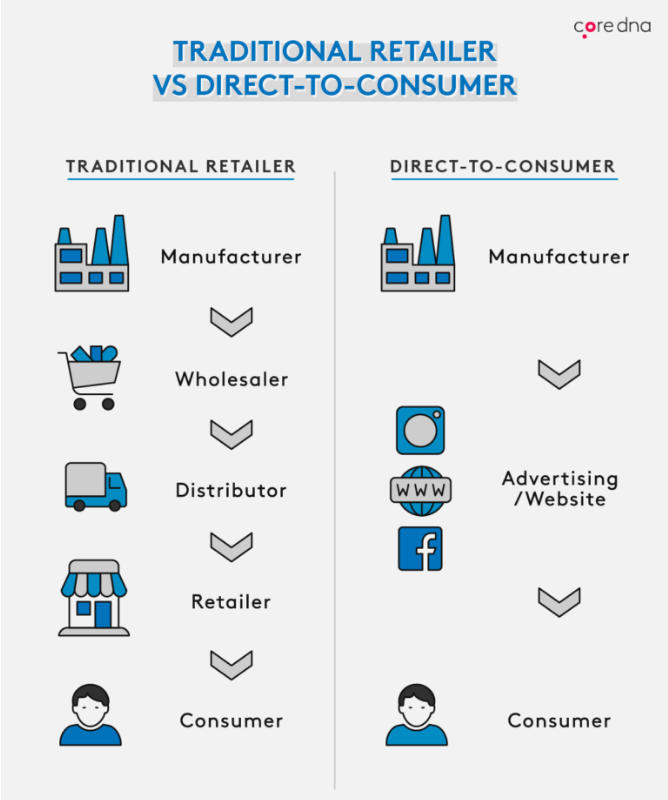Rise of Direct-to-Consumer Brands in the current market
Direct-to-Consumer Brands (DTC) have revolutionized the way companies interact with consumers and market their products. These brands, which sell their products directly through online channels, have gained popularity in recent years due to their innovative approach and ability to establish emotional connections with customers.
The growing popularity of DTC Brands is due to a number of key factors. Firstly, the rise of e-commerce has created a favorable environment for the growth of these brands. Technological advancements and the convenience of online shopping have led to an increase in consumer confidence in acquiring products directly from brands, without the need for intermediaries.
According to Statista, “Direct-to-consumer marketing is the fifth most popular trend mentioned by digital marketing professionals for 2023, with 39.1% of respondents considering D2C a priority for their brand in 2023. D2C grew by 45.5% in 2020, reaching online sales totaling $111.54 billion.”

How do Direct-to-Consumer Brands approach their strategy, and what is the key to their success?
Direct-to-Consumer (DTC) means being the absolute owner of the customer relationship and leveraging all of the data to create unique, personalized experiences that are more efficient and deliver maximum return.
As mentioned, DTC brands are characterized by their customer-centric approach, the quality of their products, and their storytelling ability. Through creative marketing strategies, these brands manage to capture consumers’ attention and generate loyal followings.
Furthermore, DTC brands have effectively utilized the power of social media and digital marketing to reach a wider audience. Through engaging content strategies and effective communication, these brands have successfully built loyal and engaged online communities.
Another key factor behind the success of DTC brands is their focus on personalization and customer experience. These brands have realized that each consumer is unique and strive to provide products and services that cater to their specific needs.
By utilizing data and analytics, DTC brands can offer personalized recommendations, create exclusive offers, and provide exceptional customer service.
Moreover, DTC brands have excelled in their ability to innovate rapidly. By not relying on complex supply chains and bureaucratic business structures, these brands can quickly respond to changing market demands. They can launch new products, test different marketing approaches, and adapt to emerging trends in a more agile and efficient manner.
Key advantages of DTC Brands
Direct-to-Consumer Brands (DTC brands) offer different advantages and benefits compared to traditional distribution models. Here are some of the advantages:
-
Improved profit margin:
By eliminating intermediaries, brands can reduce distribution costs and have greater control over their profit margins.
-
Ability to create customizable experiences:
Brands gain control over the entire customer experience chain, from the website to personalized messages and product delivery. Beyond a value proposition based solely on price, brands start building emotional and value-added purchasing motives.
-
Direct access to customer data:
By interacting directly with consumers, DTC brands have direct access to valuable customer data. This allows them to better understand their customers’ needs, preferences, and behaviors, enabling them to personalize offers and provide a more relevant experience.
-
Flexibility in decision-making:
Having a direct relationship with customers, DTC brands can make strategic decisions more quickly and agilely. They can make real-time adjustments, conduct faster product testing and launches, and respond more effectively to market demands and preferences.
-
Increased customer loyalty:
DTC brands have the opportunity to establish stronger and long-lasting relationships with their customers. By offering a personalized and customer-centric experience, they can generate loyalty and increase long-term customer retention.
-
Direct communication and customer feedback:
They establish direct and two-way communication with their customers, allowing them to receive instant feedback, understand customer needs, and make continuous improvements to their products and services.


Challenges and Considerations in Implementing a DTC Strategy
Direct-to-Consumer Brands also face significant challenges. Competition is becoming increasingly intense, making it very difficult to stand out in a saturated market. Additionally, logistics and order fulfillment can pose challenges for brands that are accustomed to working through distributors and retailers. That’s why it is important to understand the considerations that need to be taken into account when implementing a DTC model.
-
Operational restructuring:
Implementing a DTC strategy involves significant changes in the operational structure of a company. It is necessary to reevaluate and adjust internal processes, from inventory management to logistics and order fulfillment.
-
Logistics and shipping:
By assuming direct responsibility for product shipping, DTC companies must establish efficient logistics ecosystems and supply chain management.
-
Customer service:
When interacting directly with consumers, providing excellent customer service is essential. This involves having trained personnel available to answer inquiries, resolve issues, and provide timely assistance to customers.
-
Competition in digital marketing:
In a highly competitive environment, having a strong digital marketing strategy is crucial. This includes leveraging various strategies such as SEO, SEM, content marketing, and social media to increase brand visibility, drive traffic to the online store, and attract new customers.
-
Building trust and credibility:
As DTC brands lack the physical presence of a traditional retail store, they must work rigorously to build trust and credibility with consumers. This can be achieved through customer testimonials and reviews, quality guarantees, clear and transparent return policies, and a strong online presence with relevant and valuable content.
Despite these challenges, DTC brands have demonstrated their ability to quickly adapt, innovate, and establish lasting emotional connections with consumers. With their customer-centric approach, their ability to tell compelling stories, and their emphasis on quality and sustainability, these brands are changing the way companies think about marketing and product distribution.
In summary, DTC brands have emerged as a disruptive force in the business world, challenging traditional practices and offering a unique shopping experience. Their customer-centric focus, the quality of their products, and their ability to build online communities make them a great option for emerging brands.
At Lifting Group, we have been developing our expertise as a marketing agency and consultancy for over 15 years. We hope that the content has been useful for your project. If you have any questions about how to approach your DTC strategy, you can contact us. Our passion and commitment are to help your company grow.
